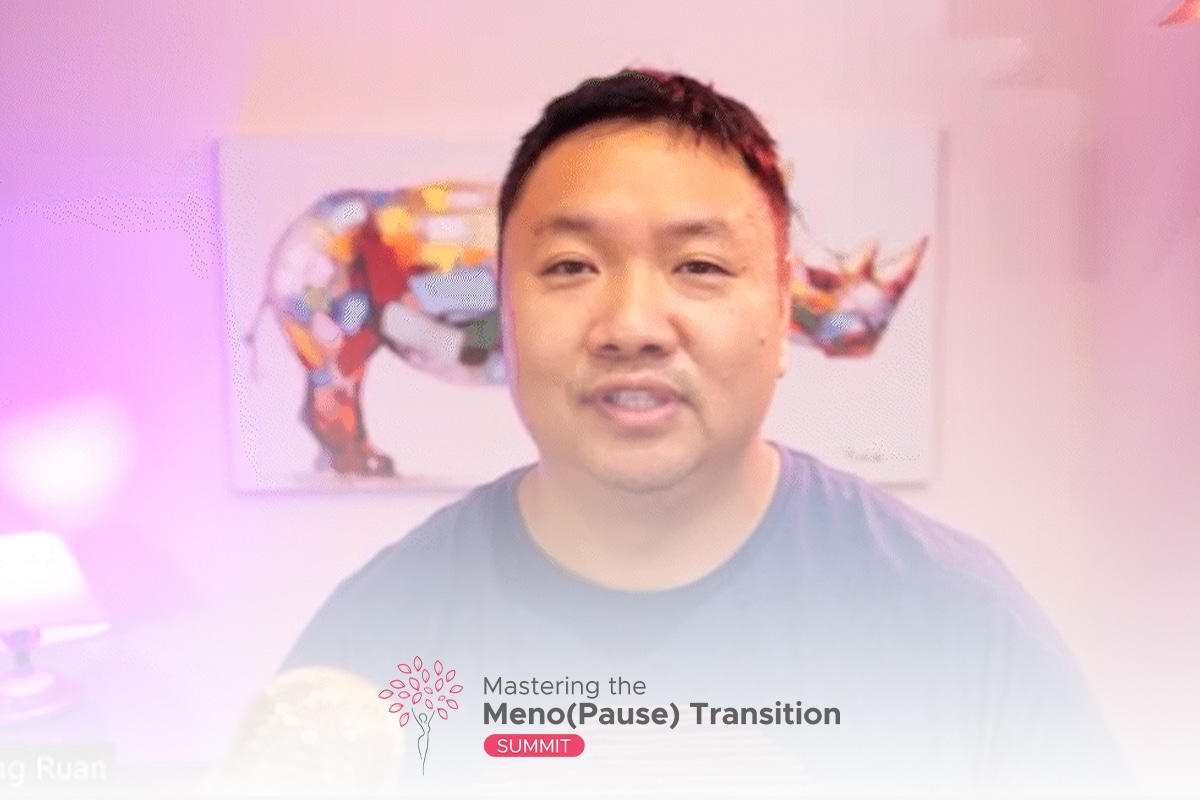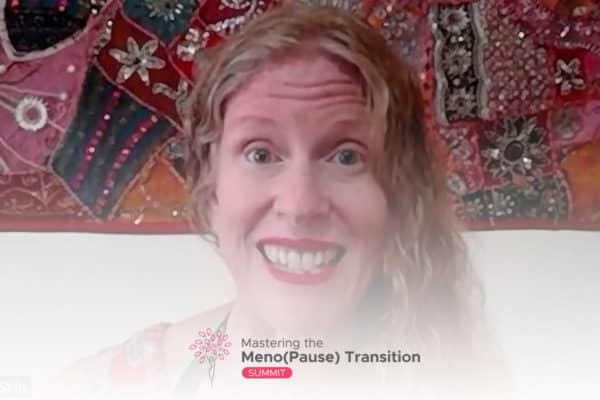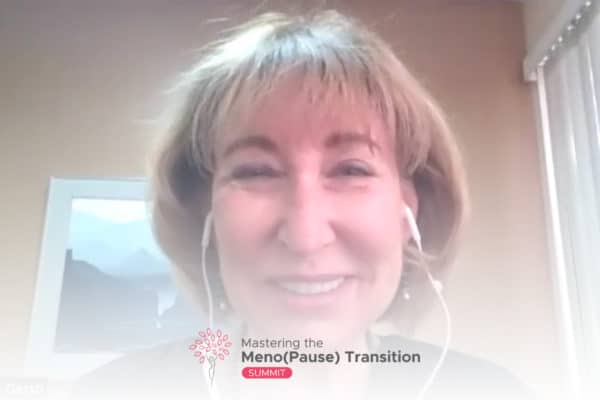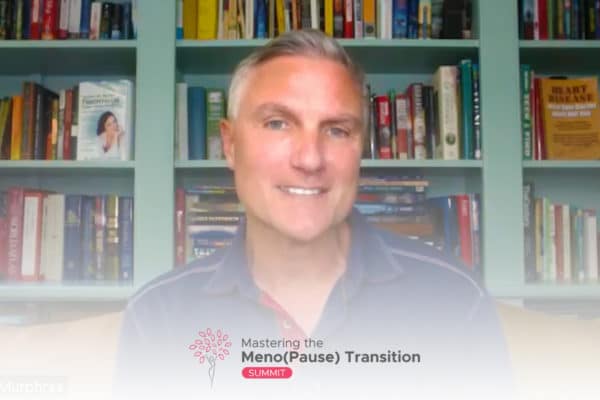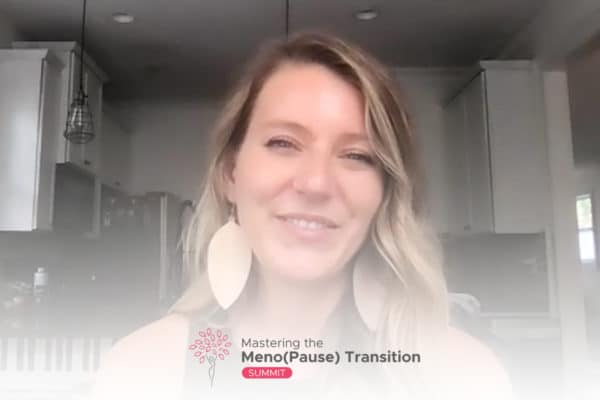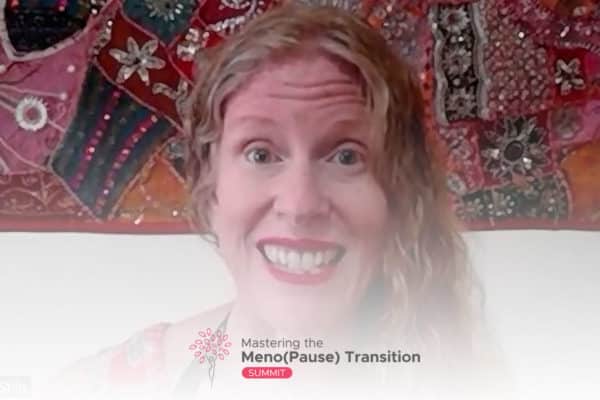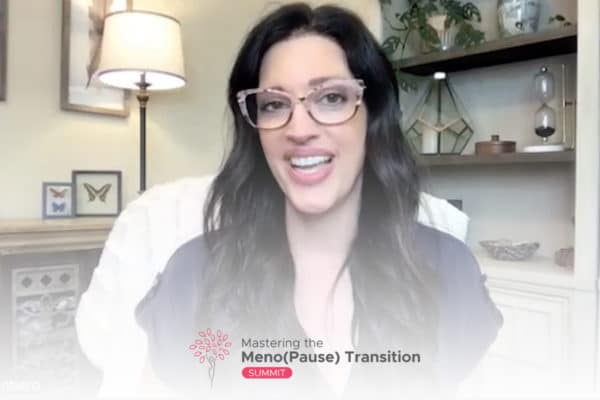Join the discussion below
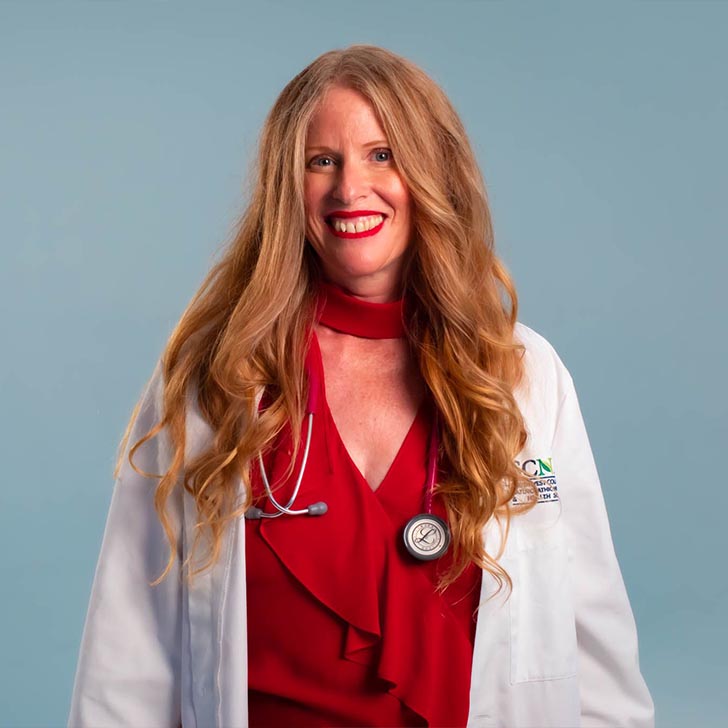
Dr. Sharon Stills, a licensed Naturopathic Medical Doctor with over two decades of dedicated service in transforming women’s health has been a guiding light for perimenopausal and menopausal women, empowering them to reinvent, explore, and rediscover their vitality and zest for life. Her pioneering RED Hot Sexy Meno(pause) Program encapsulates... Read More

Dr. Ruan is the Founder and CEO of Texas Center for Lifestyle Medicine. He devotes his career in practicing and building systems that allow for efficient delivery of healthcare. He is a board certified internal medicine physician but also have advised with companies to improve their workflow, company culture, marketing,... Read More
- Why the brain changes during menopause and what you can do about it
- Uncovering root causes of mood changes during menopause
- How to use mind-body hacks during menopause
Related Topics
Acid Reflux, Cortisol, Hormonal Balance, Hormones, Massage Therapy, Melatonin, Menopause, Reproductive Hormones, Saliva Test, Testosterone, Womens HealthDr. Sharon Stills
Hello. Hello. Welcome back to Mastering the Menopause Transition Summit. I’m your host, Dr. Sharon Stills, and we are about to have a fascinating conversation. One that I almost can guarantee you’ve probably not heard about before. So, grab a cup of tea, if you’re at home, or if you’re driving, just pay attention, you can always re-listen to it and take notes later, but we are gonna learn some really fascinating things to just kind of open up the way you think about your breath and your hormones and your brain. And we are gonna do this with my very special guest Dr. Cheng Ruan, and he is the founder and physician at Texas Center for Lifestyle Medicine. And he’s responsible for the creation of a learning program for patients www.tclmuniversity.com, which is Texas Center for Lifestyle Medicine University, which he launched during the global pandemic when there was decreased access to medical services. And it took off like wildfire. His passion is to bring integrative health to the public by offering lifestyle medicine services that is covered by medical insurance. His focus is brain and mental health, and he’s been featured in multiple media outlets, such as Forbes. And now he’s being featured here with us at our summit. So, welcome to the summit. I’m really excited to have this conversation with you.
Cheng Ruan, MD
I’m so excited to talk about this and it’s not often talked about, and for me to even discuss about what we’re gonna talk about, is just absolutely fantastic. So, let’s get started.
Dr. Sharon Stills
Yes. Yes. So just tell us a little bit about you first, and how you got into doing what you’re doing in such unique medicine.
Cheng Ruan, MD
Yeah, so, you know, my mother’s an acupuncturist. My father is an ND PhD scientist in the field of car cardiology/oncology. So I kind of had like this scientific world and the holistic world all wrapped up in one for pretty much my entire life. So, it wasn’t necessarily a departure from the norm for me. And so, in starting Texas Center for Lifestyle Medicine, really wanted to get access of really valuable, great information from the holistic community, and then inject it into what we like to call conventional medicine in the conventional insurance model, and then see how that actually marries, you know, it wasn’t the easiest road in the world, but its certainly a successful one now. And then when the pandemic hit, I realize that a lot of people are really just craving for knowledge. You know, there’s a lot of uncertainty in the world. So, we decided to create some certainty by launching TCLM University, which has been doing fabulous.
Dr. Sharon Stills
I love that. I love that. So we are gonna talk about the brain and breath and the hormones. So tell us what, tell us where to be.
Cheng Ruan, MD
Absolutely. So, I can’t tell you how many times, you know, people come to the office and they’re like, “Hey, my hormone’s outta whack.” But then what they don’t realize is, I’m very judgy. So, whenever I walk in, I’m seeing them, if they’re turning around to greet me if they’re doing like the whole body turn, if they’re next is kind of fixated in one place, I’m seeing that what their breathing patterns are. So a lot of the anatomy of a human that’s seen, maybe when you go to a chiropractor’s office, or orthopedic surgeon’s office, I tie that into hormonal hormonal balance. And part of the reason is the human body is incredible. I mean, like we create hormones for a specific purpose. So someone’s for example, perpetually traumatized about something, like PTSD, our hormonal regulatory systems will be able to accommodate for that. But when it happens over a long period of time, it no longer serves us, right? Or someone has chronic pain, and they have chronic neck issues, and they can’t really turn very well then guess what?
A lot of times their salivary, urinary hormones will be very, very different than if they weren’t in pain. So a lot of things that we, you know, just see as these sort of hormonal things, they’re not necessarily mysterious, they’re just a little more to be observed. And then lastly, the entire human skull, you know, sometimes I see how people are moving to see a lot of times people are holding their head like this when they’re talking to me and they have hormonal issues and they’re kind of rubbing their TMJ, is probably they’re grinding, And they have an entire nighttime with just a lot of stress here that affects hormonal balance. So a lot of times I just take a pause, like before we even get into like the hormones part, let’s talk about what I’m seeing here, you know, are you in any pain, are you in any stress? Like, what is your life like? You know? And so I think it is part, it’s the conversation that’s left out the most, in my experience for a lot of people, but it is my favorite part of the conversation.
Dr. Sharon Stills
So, let let’s drill down a little. So, what does that mean if the neck is out of balance, or out of alignment? How does that affect the hormones? And is it all the hormones? Are there specific hormones were specific pain patterns?
Cheng Ruan, MD
Sure, the easiest way to describe this, is to talk about the two main control switch hormones in the body. You have melatonin, which we know that’s supposed to be excreting. People are sleeping and then you have cortisol, which is increased when melatonin is decreased or supposed to be. And so that’s during the daytime, and there’s usually a nice, beautiful curve that when we test patients, if they’re not stressed out, or have any other issues, right? And so the melatonin, even though it’s a hormone, it’s also a huge trigger to balance other things that are going on. For example, most people don’t know that melatonin actually prevents acid reflux because the melatonin that your brain excretes, goes to the lower esophagus, and helps constrict the lower esophageal sphincters. So, acid reflux back. So, when you’re laying down at nighttime, you’re in deep sleep, you don’t wake up with acid reflux. That’s why a lot of people don’t get a lot of deep sleep. They wake up with acid reflux, that can happen in sleep apnea and stuff like that. And that completely wrecks your day/night cycle. So, a lot of times that melatonin balance is depleted during the nighttime, which is a lot of people. And by the time the daytime hits, their adrenals are just starting, pouring out cortisol. And then if get fatigued by one to 3:00 PM, right?
And so, that entire balance is based on our entire physiology, what we deal throughout the day. So, whether it’s psychological stress or physical stressors, in this day and age, there’s so many people like, you know, taking the phone and doing this, and a lot of posture issues, especially when people are kind of stuck at home during the pandemic and they’re working and stuff like that, which is why I’m on a standing desk right now, I’m trying to talk straight. And so a lot of postures issues actually create a lot of tension, especially for the neck areas, the fascia, which that covering of the muscle on the outside right here. And there’s a lot of nerve endings that are right here, right? And your neck is kind of important, because if someone cut off your head, you’re not gonna be alive, right? Or someone cut off your wrist, you can still be alive. So you have a lot of structures protecting this entire area.
So a lot of times I can tell that people will have a lot of tension between this muscle. And for those of you listening on audio, I’m pointing between the bottom part of my jaw, to the top of my clavicle right here, you have the stern colloidal mastoid, you have the anterior scaling. So, you have a lot of structures that are buttressing the neck right there. And when those area becomes tense, it’s like your body’s bracing for impact. So, naturally you adrenals are like, yeah, okay. You’re about to like ram into a wall, that fight or flight response, right? But what happens when you don’t sleep on a good pillow, or you’re having too soft of a mattress and stuff like that, your body kind of goes to the same thing. So progesterone and melatonin, stark being depleted during the nighttime, which is not supposed to be, and cortisol goes up. And so, even before we even get into the hormonal balance area, it’s a lot about just observations of what people are actually doing as they actually walk into the office. And a lot of times people have some major issues with the myofascia or orthopedic issues that they don’t perceive to be an issue. Cause they probably dealt with it for 30 years. You know.
Dr. Sharon Stills
I know, I was a massage therapist before I became a physician. And so I have such an appreciation for the physical body for chiropractic for massage… And a lot of women listening think probably, oh, I do that once a year on my birthday for a treat, or my anniversary, but I’m always preaching. So, I love that you’re preaching that too, that this is medicine, it’s not a special treat to get a massage. It’s okay to get a massage regularly, your physical structure.
Cheng Ruan, MD
Exactly. And massage, and you know my mom’s acupuncturist. So everything’s about the muscle and the myofascia, even massage therapy. It’s not, you know, and I hate it when people treat it like an optional thing, sometimes. When in reality, it really is something that affects the quality of life, like big time, you know, big time. And so, if I were to, and we’ve done this before in our practice, and we used to do a lot of this and not much so much anymore, but what we do, we just wanna look at what people’s hormonal balances are, in different physiologies. So, usually a saliva test. And we find that those people who undergoing like, you know, seven days straight of acupuncture or massage therapy, if you look at their hormonal balance curves, they look completely different from one week to the next. And that’s not surprising, because that really, that a lot of the sense of that peace, and the sense of that, the hormonal balance really relies on what our body is going through, you know, physically.
And so, you know, during the pandemic actually, and this is humorous for me, but it’s not that humorous, I guess, is they talk about how a lot of military veterans with PTSD, there’s a huge association with, 86% association with low testosterone. And you see on the news, it’s low testosterone, really the cause of PTSD. I’m like, well, it may be the other way around where the trauma causes decreased production of the reproductive hormones. So in women, you look at progesterone as one of them and men is progesterone and testosterone, right? And so even men go through something like this, and the brain’s physiology of a man, when they have hormonal balance like that, mimics a menopausal woman. And so we, so in our facility, we look at the quantitative EEG, which is looking at electrical signals of the brain. And I can actually tell that a lot of people going through a lot of stressors and menopause, they look like men with PTSD and vice versa. And so that’s where the similarities come in. I’m like, okay, you know what?
Let’s talk about psychological and physical trauma as a primary function first that affects hormonal balance. And let’s address that and believe it or not, I’m really proud to say, my facility, we’re really able to tease out stories has never been told, especially like rape or sexual violence, even from spouses. And that’s never really been told to, not just any doctor, but any human as well. And so once we’re able to cultivate that trust and bond is no longer becomes like a hormonal issue. You know, let’s talk about the actual trauma, and we have mind body medicine expert in our facility that does that as well. And so that’s something that I honor, as like the foundational, before we get into like a lot of the technical jargons of hormones and stuff like that.
Dr. Sharon Stills
I love that. I always say that our physical symptoms start out here, they start in the emotions and then if they’re not attended to, like a severe trauma like that, they come into the body. So, the body can start screaming, cause then perhaps we’ll pay attention, when we’re in physical pain. So, that’s powerful work you guys are doing there, in showing the connection. And so brain changes during menopause what do you see? What can women do about it?
Cheng Ruan, MD
Sure, sure. Let’s talk about that for a second. So menopause is something that women goes through, obviously, you know, my wife’s an OB/GYN, so we talk about this pretty much all the time. So, menopausal changes occur, and there’s physiologic changes. And then there are things that can move the needle on how severe they are, right? So, we know during menopause, that sexual production actually decreases, but most people get symptomatic by the speed at which they decrease, and not necessarily the total amount. So, the percent drop over time of like progesterone, for example, creating hot flashes, et cetera, right now, why is this important? This is important because the things that affects the speed of those changes are also the stressors in our lives. And even like some people are looking at the television screen or the computer screen right now that a lot of the blue light can actually suppress hormonal regulation. And so, there’s a lot of external things that are there that affect it as well. And so let’s talk about what the brain goes through. So, the brain can actually sense that there is decreased hormonal production and the brain itself has its own hormonal regulators as well. So, there’s a cause and effect, and a big cycle the brain goes through.
So, as a human brain goes into that menopausal state, then there’s different areas that get highlighted. We call this power to frequency ratio in EEG, and these areas correlate with the fight or flight centers of the brain. And so a lot of times we’re seeing the anatomy and the functionality of the brain being very similar to someone like an aggressive male, for example, right? And so part of the reason is because of the downshift in that hormonal cycle pathway. Now that sounds really sign to me, but I wanna make it super simple for people understand. As hormones go down the human brain, that doesn’t matter what gender becomes very similar, the risk for memory loss and dementia, anxiety and depression all go up after that time, regardless of the gender. And we’re seeing that for heart disease and other factors as well, but specifically focusing on the brain, is because a lot of the hormones that allow a woman to produce actually protects the brain during, before the time of menopause. And as it protects it, it’s losing its protective mechanism. So, whatever assault the brain’s been going under all of these years, they tend to accumulate and they show up during this menopausal time. And so that can be scary for a lot of women, because a lot of women feel like, oh, this is, you know, abnormal, or this is something that’s really shameful and it’s really not, which is I have to address, really, what’s the underlying cause.
Dr. Sharon Stills
Right, a lot of times I hear in my clinic, about I just don’t feel like me. I don’t know who I am. I’m not yeah funding the right way. I’m just… I don’t recognize myself is very, very common. So, that’s kind of explaining why. And so these root causes, what of, so the hormones are dropping, What else is playing a role in these brain changes and these mood changes, and what are some mind/body hacks that we can do to change it?
Cheng Ruan, MD
Sure, sure. There’s a lot of speakers on the summit. That’s covering other things, but I’m gonna try to tackle that some of the things that aren’t really talked about very much, in terms of root causes. So, if you’re someone who suffers from chronic seasonal allergies, or just chronic allergies in general, a lot of nasal stuffy nose, that’s a huge impact for hormonal balance. You’re like, well, why? A lot of things that affect the breathing, affects our are hormone balance. So all mammals, not just humans, but all mammals, have these beautiful little cavern structures right next to the nose, and it’s called the paranasal sinuses. So, para means next to and nasal means the nasal bone. So right next to the nasal bone, you have these two caverns and they’re called sinuses, paranasal sinuses. And the paranasal sinuses have receptors. And these receptors sense a lot of different things, but they’re able to sense the velocity of air going through and the pressure within the sinuses. And so people can sometimes have those areas plugged up and they can have sinus headaches and migraines and stuff like that.
We understand that, but what happens is over time, the more plugged up this area is, the less production of a very, very important substance in our body called nitric oxide becomes, and nitric oxide is required to deliver blood flow and oxygen to all parts of our body, right? And so as a nitric oxide starts being depleted, blood pressure starts going up, blood sugars start going up. People are having metabolic issues. People are starting getting that belly fat, right? People can start developing fatty liver issues. So, these are from decreased nitric oxide. And a lot of times it may be from impaired breeding. So, a lot of people who suffered from like environmental toxins, maybe they have black mold in their house. Maybe they have a lot of volatile organic chemicals that are kind of roaming around and they’re being really affected and it’s causing a lot of brain fog. Well, it really affects the way that our hormones are as well. And so looking at the root cause, maybe looking at root causes, of what’s causing those congestion issues, and whatnot, you know, we’re in Houston, Texas, and there’s mold everywhere in Houston, Texas, it floods every other month, right? And so, you know, there’s black mold, in 86% of the buildings, you know, in Houston. So, they’re everywhere, but the mold or the other things aren’t necessarily the culprit. It’s the fact that a lot of people can’t tolerate it, is because of these sort of plug up sinuses right.
Now, some people have smaller calibers than other people. And it’s funny because my dental friends actually tell me that because when they do cone x-rays they can see people, some people have really underdeveloped sinus cavities, and those are the people that get more predisposed to things like brain fog, especially during the menopause, or even have early menopause because of those issues as well. So there’s ways there’s actually ways to improve that. There’s a book that that’s out now, called ‘Breath’ by James Nester. He was really made famous by Joe Rogan, was on Joe Rogan podcast for two and a half hours talking about breathing. But there are ways, and there’s different breathing mechanisms from box breathing to wim hop breathing, and several different things that you can actually improve your hormonal balance, literally within a few seconds, right? And this is the best example how; we know that some people, when they take deep breaths in and out, they feel like they’re gonna pass out, right? And then their face gets a little flushed.
That’s nitric oxide, nitric oxide, is being produced. Blood pressure’s dropping their face, getting flushed. That’s literally through a different nasal breathing techniques. And then the pH of the body goes up, which means the acid balance of the body goes down. And so as acid goes down, pH temporarily goes up. You can experience different effects on the brain, and practicing this actually significantly increases the way that we produce melatonin at nighttime to allow that circadian cycle, allow the balance of our day/night cycle, to really the master hormone switches. So, you guys are wondering what that looks like. Go ahead at www.TCLMuniversity.com, midway down. If you scroll down, there’s something called “Mind Sculpting Master Workshop”, where Jenny, my mind, body medicine practitioner and I, and my other health coach, Jillian, we walk people through this entire process and I kind of tie it together much more than I can, in this short segment interview with you.
Dr. Sharon Stills
Can you give us a short breathing exercise though, that we could, we could all do together?
Cheng Ruan, MD
Yeah. So I won’t actually do the exercise, but I’ll kind of explain, and this is something I did on stage recently. So that’s kind of fun. So instead of just doing a breathing exercise, cause everyone’s different, we’re gonna do is kind of a check in. And the checkin is to see, well, how are you breathing right now? And so one of the things I encourage people to do, is either go on Amazon and buy some mouth tape, and tape your mouth shut, and literally just walk around at a brisk walk for about five minutes. You’re, if you feel like you’re struggling to breathe, which about one in one in four humans have the issue. If you like really struggling, and you really have to rip that mouth tape off, then what’s happening is, you’re probably mouth breathing at night time. So the idea is to do the mouth taping and build up that stamina over time. As you take breaths into the nose, the internal structures will, over months, will start slowly to dilate, your mucous membranes, will start decrease in thickness over time. So, that’s one of the easiest things to do. And what you’ll notice now is that mouth tape, is a huge phenomenon right now. You have a lot of people at the park. You’ll see them have a clear tape right here. And these are marathoners. They’ll start jogging. They’ll start training that to increase that natural oxide delivery.
A second thing I highly recommend, is to also start with box breathing, and box breathing is quite simple. So, what you want to do, is you want to start taking a deep breath. So, four seconds inhale, four seconds hold, four seconds exhale, four seconds out. Now, some people can’t do four seconds. It’s almost impossible for them to do that. Start slower and start in a lower number of seconds. And so that’s able to help you kind of gauge where you are right now. And then the third, then the last thing I really want people to understand, is that most people who tend to have like a lot of the nasal obstruction, also have a lot of neck tension right here. They have pain, especially around the brows, or the temples, or both. And even just behind here, these are what we call trigger points. And these are the anchor points of the fascia. And so some people tend to look like this, and we, guys who are listening on audio, I’m just wrinkling my brows.
And a lot of times they’re in my office and they’re just like, wrinkling their brows the whole time, they’re trying to hold tension right here. That’s actually an airway issue, you know? And so, but be aware of that and start doing some meditative relaxation, deep breathing exercises. Even 10 deep breaths will help a lot. And when I say breaths, take belly breaths. You know, this is my message to women. It is okay to expand your belly during breathing. A lot of people, a lot of women just tend to hold it in. Men do the same thing as well. But as you breathe in, make sure your belly expands. It’s not like you… you’re not doing the huge chest rise, right? You’re doing a whole soft belly breath, which you want the allow the belly to expand, but that draws air into the lower part of your lungs as well. And so those are my main things that I try to teach our patients, but, of course, our breathing classes are far more intricate than that.
Dr. Sharon Stills
Fantastic. I always say breath is the best medicine. So these are some good little pieces of medicine that can really shift. And so can you just connect? So the nasal passages and the breathing, is that affecting your estrogen? Is it affecting your progesterone? What exactly is happening there?
Cheng Ruan, MD
Sure, let’s go back to that for a second. So the breathing mechanism is activating nitric oxide, and nitric oxide affects your hormonal balance, whether it’s cortisol or melatonin, which in turn affects all hormones. So thyroid progesterone, estrogen per alone, et cetera, et cetera. Right. And so what’s happening, is that the breath allows the body to be in some sort of physiologic state. If there’s impairment in breathing, the body will naturally want to be armed to fight, right? It naturally wants to be allowing the body to go into that fight or flight state. And so that doesn’t feel very good for most people, for most people, they’re always feeling on alert. They always have this sort of baseline anxiousness, especially around menopause, and they’re like, what’s going on, right? And so the connection is very simple that… And let’s talk about Chinese medicine for a second, we’ll switch gears. So in Chinese medicine, we have this concept of Chi. So Chi most people think it means energy, actually does not.
So let’s let’s for right now, translate energy or Chi into breath or flow of air, right? And so what’s happening is, initiate the flow of energy Chi into the body, through nasal breathing, and then mechanisms such as like tai chi, or qigong are mechanisms that you can allow the delivery through circular and non-linear movements of the body. That’s why a lot of people do tai chi, to allow that delivery of this chi to the body. So, what’s happening here, is that is a nitric oxide dependent mechanism, that is a hormonal dependent mechanism, such as estrogen progesterone. And that is a mechanism that, without the actual mechanism there, this is how most chronic disease states develop, from a lot of menopausal symptoms, all the way to Alzheimer’s dementia. That’s exactly how it develops, it’s impairment of that system. And so if we were, and by the way, during COVID, this is where the best part is during COVID. A lot of people are starting to realize that the nasal microbiome, which is affected by the flow velocity into the nose, the nasal microbiome, or the bacteria within the middle, or just below the middle turbinate, there are specific species that correlate with how well people do with COVID.
And those species are determined by the amount of airflow velocity into the perinasal sinuses, believe it or not, right? And so we know that, yes, there’s a gut microbiome, which is the bacteria that’s really assisting with the digestion and the guts and the healing, the gut there’s oral microbiome, like in the periodontal areas, the teeth areas, the gums, and then there’s the nasal microbiome, all three are just as important for that balance. And my good friend Feliz Guchi, who you interviewed on another portion of this summit, she talks about the estro-biome. The estro-biome is basically the gut bacteria that allows the metabolites of estrogen to really go through. Well, now we’re discovering a lot of those organisms, also in the perinasal sinuses, and then also the other sinuses that are there as well, as well as the oral cavity. So, this is new science. And I think that study in COVID, really allowed us to figure why coronavirus was causing a lot of these hormonal symptoms. They were causing irregular cycles in cycling females that were causing significant menopausal symptoms, right? And we now understand that that is a… It’s basically a mechanism that this allows a lot of breath to regulate what’s supposed to flow through.
Dr. Sharon Stills
Yes, yes, yes, yes. The estro biome. We also had a great talk on here with Dr. Carrie Jones and we, we really… We dug deep.
Cheng Ruan, MD
Oh yeah. Yeah.
Dr. Sharon Stills
So melatonin, I love what you shared about melatonin and acid reflux. And so if women are listening, and they’re like, Ooh, I have acid reflux, how do you recommend they look into their melatonin, and can they can get it over the counter. Do you recommend they just go out and try some? Or how do you, what’s your viewpoint on that?
Cheng Ruan, MD
Yeah. Unfortunately when you take melatonin, it doesn’t necessarily have the same effect as when your brain produces it. It has some of the effects, but, you know, melatonin dosing is completely individualized. Some people will take half a milligram. Some people take 10 milligrams, it’s the same thing. But when I say melatonin, it’s not necessarily the stuff, the counters, the stuff that your brain produces to induce sleep. So let’s say you have, someone has asked acid reflux at nighttime, which completely impairs sleep. And when you impair sleep, you impair your hormonal balance, right? We know that when you take your eating window and end your daily eating, when there’s sunlight and after sundown, there’s no eating. So we call a circadian rhythm diet, or circadian rhythm fasting, that actually helps the melatonin increase at nighttime. And even just shifting that eating window, like the next night, you may not have that issue.
Another thing is pain. So, a lot of times, if you’re not in a good pillow or comfortable position in bed where you’re side sleeper, but your pillow doesn’t support side sleeping well, that pain can actually knock you out a deep sleep. You actually get acid reflux from that as well. A lot of women also have undiagnosed sleep apnea. One in four humans have some sort of upper airway airway resistance. About half of those humans tend to have sleep apnea, and women don’t have to snore to have sleep apnea. In fact, most women don’t snore to have sleep apnea, and that’s really heavily underdiagnosed. And so we might wanna seek out medical attention, for that as well. And the last thing I kind of put out there, is the thing with the melatonin, is that if you are trying to go to sleep and your brain is thinking about something, and maybe a traumatic event, by your brain thinking about it, it can’t really tell the difference between reality and what your thoughts are. So, your cortisol’s naturally high, no matter how much melatonin you take, it’s really hard to suppress that cortisol. And so this is why I tell a lot of people to go into sort of the mindfulness, meditative state, you know, listen to some minoral beats or something to calm yourself down.
And that’s far more effective than trying to, you know, melatonin and a lot of women listening to this. If you are taking sleep medicine and sleep aids, and your brain is not ready to go to sleep, meaning that it’s still sensing a lot of stress that are really there. What you don’t realize, is that even though you’re inducing sleep, your brain actually doesn’t necessarily go into deep sleep. So, it doesn’t get into restorative sleep. So, when we wake up the next morning, it still feels like super laggy, that happens with most of the sleep aids that are out there, including supplements as well. So, supplements and pharmaceuticals. So, it can tell you how important it is to takes time for yourself. You know, at least once a week, go into that de-stress mode, get a massage, do something for yourself. And that has a huge implication on hormonal balance.
Dr. Sharon Stills
I’ve been saying it all through the summit, stress is the root cause of 99.99999% of everything. And so here, we’re talking about, I love that you’re bringing in the physical stress and even from the pillow you’re using, do you have any pillow tips? How does someone know if they have the right pillow?
Cheng Ruan, MD
That is a good question. Well, first of all, you’ll know the next morning and then keep trying, and keep trying different things as well. That’s really, honestly, it’s a really good idea to go into like a chiropractor that you really trust, a physical therapist who knows about pillows. And even if you have to get something custom, I’d go ahead and do it. And then if you go into specialty like mattress stores, they’ll have a lot of pillows, for you to try to figure out what’s best for you. Like, do not settle. And yeah, I think this kind of feels good. I’m a you know, take care of it. Most of the commercial companies that make these pillows right now have like a 30 or 90 day trial with no risk for these pillows. So, go ahead and explore those options as well. And statistically speaking, 50% of you listening to this have neck issues because your a pillow. So that’s a big number. So you can go ahead and seek those professionals out.
Dr. Sharon Stills
So are you a fan of regular chiropractic adjustments?
Cheng Ruan, MD
Well, it depends. So there, the… So having a good chiropractor on your team is exceptionally important, right? Someone you trust, right? And there’s a lot of people who may not jive with their chiropractors, just like any of the other doctors, you’ve gotta have someone that you trust, and that’s on your side, right? And some people have other orthopedic issues. They have cervical spine de-abilities. So they have genetic predisposition to have messed up cervical spine, like ehlers danlos syndromes, rheumatoid arthritis, et cetera, et cetera. And so it’s really individualized approach there. Now, my mother’s an acupuncturist. I’m really biased. So I think everyone should get acupuncture. I do think that it provides a different type of benefit than chiropractics, and depending on the style of acupuncture as well. And each acupuncture is different, just like each chiropractor as well. But I’m a fan of both modalities, I use both modalities, but you know, obviously I go to my mom, she’s lives down the street, so…
Dr. Sharon Stills
I’m trained in acupuncture as well.
Cheng Ruan, MD
Oh, great. Awesome.
Dr. Sharon Stills
So, I’m very biased too. I think it’s like the holy Trinity, you gotta have an acupuncturist, good body worker, good chiropractor. And you need to be paying attention to those modalities, because they’re so often overlooked, or you get into a car accident, God forbid, so then you go see the chiropractor, but these are tools that can help us transition all of life, especially through this hormonal transition through menopause that can be supporting us on mind, body level. And so I’m glad that you’ve brought them up, because I personally partake, and I prescribe it to my patients all the time. And it’s not like this is something fluffy, cause I think we’re just so trained to want a pill. And so you come to someone like us, so alternative option, you wanna pill, you wanna vitamin, but it’s all these other tools that support the body. The supplements are supplements to the lifestyle, to the choices you make to heighten your physical bodies. So I’m so glad you’ve brought that up. You’ve brought up so many, so many good points. So, in summary, what would you like the women to leave with what should be on their to-do list, or their to explore list, from all the things you talked about?
Cheng Ruan, MD
Well, first of all, to the women listening to this, and you deserve to have time for yourself, that’s first and foremost, you know, I have three daughters, right? And I’m very female dominated in my family and teaching about life balance is exceptionally important. You know, part of living is relationships, and a lot of women go through a lot of phases in their lives, the different relationships. And then when menopause hits, and the hormones go bonkers, a little bit and there’s like, okay, well whatever’s affecting my hormones, must be affecting my relationships, but you have to realize that the other way around, it’s true as well, whatever relationships you’re in, also affect your hormonal balance, depending on how traumatized you are in specific relationships. So, taking the time to do self analytics is the most important thing that I can reach my audience to. And I really want you to really honor yourself, right? And so by honoring yourself, you’re able to honor others as well, but you’re also able to create that balance that, that you deserve and that, you know, knowing that you deserve that balance, it may be the biggest hurdle for most women. So that’s the message I like to deliver.
Dr. Sharon Stills
Mm, beautiful. I stand behind that 3000% and that’s why we’re here just being here and taking time and listening and learning and attending the summit is a yes to yourself is a yes to, I deserve to take care of myself. For so long, we’ve been taught self-care is selfish, and self care is life sustaining. Self care is necessary. It is not optional and it is not selfish. We can’t pour from a watering can that’s empty. We are the watering can, if we wanna give to others, we have to fill ourselves up first. So, thank you for that beautiful reminder. And thank you for bringing a different twist to the sinuses I see. I run thermography scans on patients and sinus are always a root cause of things that are going on. And like you said, you don’t have to be snoring to have sleep apnea. Sometimes you don’t have to have actual sinus congestion or headaches and you can still have sinuses that are blockages to your healing. And so I love that you brought that to the table, and the breathing and the mindfulness and the self care and just looking at it a different way. There’s so many different ways we can look at how we heal. And so take what resonates, go get educated, go get an EEG, go breathe differently. See if you have sleep apnea, find a new pillow. There’s breathe. And tell us your website again, cause that sounds like a wonderful resource for the women listening.
Cheng Ruan, MD
Yeah. Go to the website. It’s www.TCLMuniversity.com, which stands for, Texas Center for Lifestyle Medicine University.
Dr. Sharon Stills
I’m so glad you… I’m like, what is it? Is it Texas? You read my mind, I was trying to figure out what it’s… Well thank you for being here, and you have a summit upcoming that I’m gonna…
Cheng Ruan, MD
I do.
Dr. Sharon Stills
You’re hosting about the brain. So make sure you stay connected, because there’s gonna be a lot more to learn in a couple of months and we’ll be just diving in deeper. So thank you so much for being here and for the amazing work you do, and for being such a compassionate male, who really, I didn’t know, you had three daughters, so you are definitely first in the feminine. Thank you for supporting us and cheering us on. It’s nice to have male energy doing that as well. And so stay, well, everyone, you’ve got a lot to percolate on from this episode and we’ll be back soon, so…
Cheng Ruan, MD
Thank you.
Downloads

